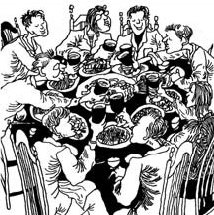 The People's Daily on Monday reported a decision of the Party School of the Hubei provincial committee prohibiting its students from using public money to treat each other to feasts.
The People's Daily on Monday reported a decision of the Party School of the Hubei provincial committee prohibiting its students from using public money to treat each other to feasts.
The students are all leading officials from different government departments or State-owned enter-prises in the province. The media report said the several-month-long course at the Party School provided an opportunity for the officials to become friends and exchange information. "Many of them," the report wrote, "have the right to sign bills. So some of them hosted banquets to treat each other using public money."
The Party School's decision also prohibits students from "playing gambling games, receiving precious gifts or keeping their government-allocated sedans in the campus."
Obviously the decision was made with a view to fight corruption.
But it seems to be a little bit funny, if not ironical. No feasting on public money for private purposes, staying away from gambling and refusing bribes are essential qualities a public servant is required to possess. These students all have been in leading positions for some time. They should have met the requirements long before promotion to leading positions. Isn't it ironical that they should be taught about the basic requirements, at this stage of their political career, in the Party School?
The school's decision is actually an acknowledgement of the fact that malpractices still exist among officials. Of these, taking bribe is unmistakably a crime that most officials would shun though it is far from being non-existent. Feasting on public money, however, appears not that criminal, for government organs and enterprises sometimes do need to entertain guests for business purposes. The problem is how the "necessity" is defined.

Most leading officials have the authority to sign bills for restaurant dinners, and the account check done afterwards is generally slack. Hosting banquets that have little to do with business, or that are costlier than necessary has become quite common. It is widely believed that China's eatery industry owes a large part of its boom to the patronage of official gourmets.
The problem has been a major target of the public anger against official corruption, and the authorities have made it a focal point in efforts to build a clean government. However, corruption in a less irksome guise has never stopped and seems to have become more rampant. The nation's drive to address the problem seems to have had little effect.
For instance, the government of Wuhan, capital of Hubei province where the aforementioned Party School is located, officially issued a ban on using public money to host banquets for non-business purposes in 2005. But the practice persists. A reader of the news about the Party School posted an online comment that the street on which the school is located has more than 10 restaurants, which are "crowded everyday."
"If the school's students are banned from eating in the restaurants, a large number of waitresses from rural areas will lose their jobs," the netizen says mockingly.
The fact that feasting on public money has become a chronic affliction may be attributed to a number of reasons. For instance, hosting banquets for business purposes is a tradition in Chinese culture, and it is sometimes difficult for the audit authorities to check the problem. More worrisome, however, is that a number of officials have developed a mentality that eating on public money is not wrong. Even a section of the masses regard it as a "mild malpractice" as compared to millions of RMB raked in by officials in bribes.
If that mind-set becomes popular, it would be corruption not only of officials, but that of our whole nation.
E-mail: liushinan@chinadaily.com.cn
About the author:
劉式南 高級編輯。1968年畢業于武漢華中師范學院(現華中師范大學)英文系。1982年畢業于北京體育學院(現北京體育大學)研究生院體育情報專業。1982年進入中國日報社,先后擔任體育記者、時政記者、國際新聞編輯、要聞版責任編輯、發稿部主任、《上海英文星報》總編輯、《中國商業周刊》總編輯等職。現任《中國日報》總編輯助理及專欄作家。1997年獲國務院“特殊貢獻專家政府津貼”。2000年被中華全國新聞工作者協會授予“全國百佳新聞工作者”稱號。2006年獲中國新聞獎二等獎(編輯)。
?相關閱讀:
Officials should channel spirit of Bethune
Protecting farmers from callous frauds
Reward job creators more sensibly
